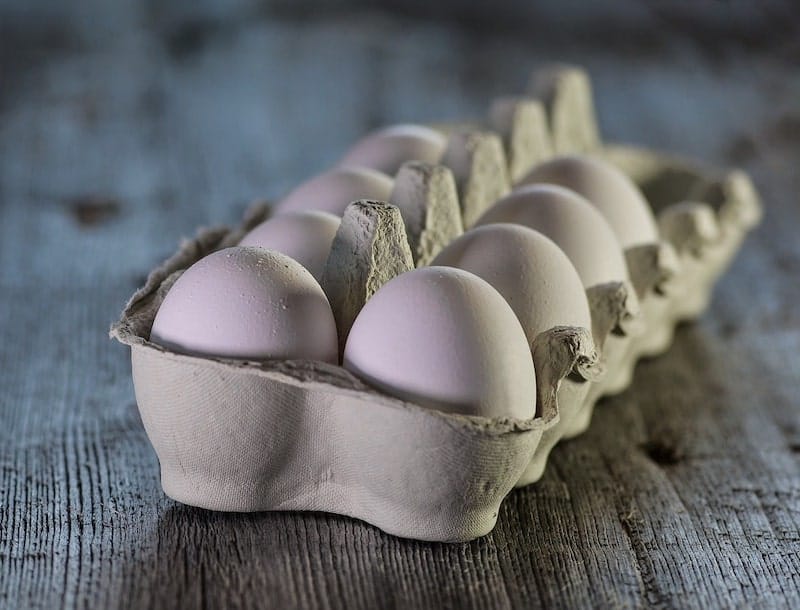Are White Eggs Bleached? (Answered!)
When choosing eggs at the grocery store, there are increasingly more options, including free-range, organic, and more.
But the choice between white eggs and brown eggs can be confusing because it may seem that white eggs are bleached to achieve that color. So, are brown eggs more natural, or are white eggs bleached?
White eggs are not bleached. In fact, all chicken eggs start out white, but some breeds of chicken naturally deposit additional pigments to the eggshell as they lay the egg.
As a result, some chickens naturally produce white eggs, while others produce brown eggs. Both colors are natural to that breed of chicken.
Read on to learn more.
Are White Eggs Bleached Brown Eggs?
No, white eggs are not bleached brown eggs.
Chickens with white feathers and white earlobes lay white eggs, while chickens with reddish-brown feathers and red ear lobes lay brown eggs.
In fact, some breeds lay eggs that are naturally green, blue, red, and other colors.
Additionally, the color of the eggshell can also be influenced by environmental factors, diet, and age of the chicken. For instance, a chicken that consumes a diet rich in certain natural pigments might produce eggs with a slightly different hue.
Are There Naturally White Eggs?
All chicken eggshells start out white as they are formed inside the chicken’s body.
Some chicken breeds have natural pigments in their bodies deposited onto the eggshell as it passes through the oviduct, permeating the shell and creating natural varieties in egg colors.
White chicken eggs are naturally white because they start out white, and a white chicken does not deposit any additional pigments into the shell during the laying process.
Some of the more interesting egg colors are produced by breeding different chickens with different roosters.
For example, a hen from a blue-egg breed, when crossed with a rooster from a brown egg breed, will lay olive green eggs.
Chicken eggs may also be spotted or unevenly colored, and an individual chicken’s egg color may change or become paler over time.
It’s also worth noting that certain factors like stress, disease, or changes in the chicken’s environment can sometimes affect the consistency and color of the eggs they produce.
How Do Eggs Become White?
Chicken eggshells are naturally white when they are formed inside the chicken.
As the egg passes through the oviduct during the laying process, a chicken may deposit pigments incorporated into the shell structure and affect the final color.
However, white chickens lay white eggs because they do not deposit additional pigments while laying eggs.
While chicken eggs are cleaned before they are delivered to consumers, they are not treated or bleached to make them white.
It’s essential to understand that the cleaning process for eggs is primarily to remove any dirt or fecal matter and to ensure the eggs are safe for consumption. This cleaning does not alter the natural color of the eggshell.
What’s the Difference Between White and Brown Eggs?
The most popular egg-laying chicken breeds in the United States are breeds with either naturally white or brown feathers and earlobes. Earlobes are a more reliable indicator of egg color.
Still, feathers are easier to see from a distance, and almost all popular breeds of chicken have earlobe color that matches their feather color.
For example, a chicken with white feathers lays white eggs, while a chicken with brown feathers lays brown eggs.
There are no nutritional differences between white and brown eggs.
White and brown eggs also look and taste the same, and there is no difference between the two eggs except for shell color.
Larger eggs have more protein, nutrients, fat, and calories, but those factors depend on the size of the egg, not the color.
You may have noticed that brown eggs are often more expensive than white eggs, which may lead to the perception that brown eggs are healthier or that white eggs may have been breached.
However, the price difference isn’t because of egg color—it’s because of the chicken’s size.
White chickens are smaller, requiring less space to house and less feed to raise and maintain.
Brown chickens are larger, so they need more food and more space, making them more expensive to keep and thus making their eggs cost more.
Another factor that can influence the price of eggs is the method of farming. Free-range or organic farming methods often have higher costs associated with them, leading to pricier eggs regardless of their color.
FAQs
Why do some eggs have a thicker shell compared to others?
The thickness of an eggshell can be influenced by the chicken’s diet, age, and overall health. Adequate calcium intake, for instance, can lead to thicker shells.
Do the colors inside the egg (yolk and white) vary based on the shell color?
No, the color of the yolk and egg white is more influenced by the chicken’s diet than the shell color. A diet rich in certain foods can lead to a darker yolk.
Is there a difference in the shelf life of white and brown eggs?
No, the shelf life of an egg is not determined by its shell color but by factors like storage conditions and freshness at the time of purchase.
Can you tell the freshness of an egg by its color?
No, the color of the eggshell doesn’t indicate freshness. However, a freshness test can be done by placing the egg in a bowl of water. Fresh eggs will sink, while older eggs will float.
In Summary
While there are many different varieties of chicken breeds, egg options, and colors, brown and white eggs are natural.
White eggs are not bleached brown eggs and are not whitened during the cleaning process before they reach the store.
You can rest assured that white eggs are just as healthy and natural as brown eggs, and there is no nutritional difference. It’s simply a matter of your personal preference in egg color.







